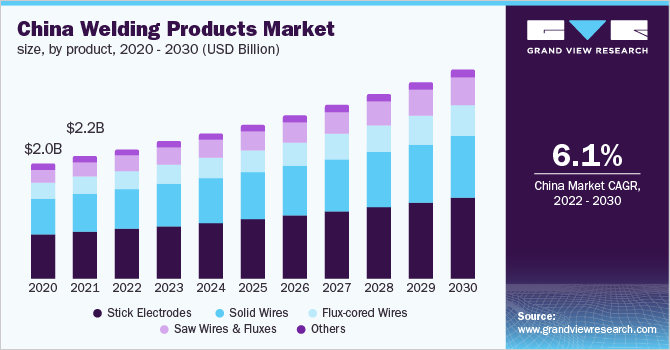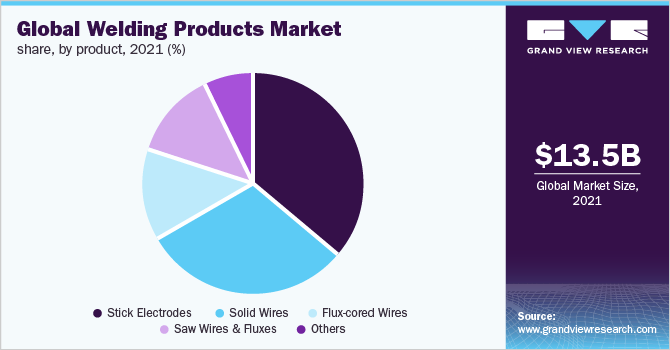
Welding Products Market Size, Share & Trends Analysis Report By Technology, By Product (Stick Electrodes, Solid Wires, Flux-cored Wires, Saw Wires, and Fluxes, Others), By Region, And Segment Forecasts, 2022 - 2030
- Report ID: GVR-2-68038-856-5
- Number of Pages: 198
- Format: Electronic (PDF)
- Historical Range: 2017 - 2020
- Industry:Advanced Materials
Report Overview
The global welding products market size was estimated at USD 13.49 billion in 2021 and is expected to expand at a compounded annual growth rate (CAGR) of 4.4% from 2022 to 2030. Factors such as design flexibility, reduction in the overall weight of the buildings and structures, and the ease in modification are projected to promote the use of welding products in construction and industrial application segments. The global construction sector is undergoing limited growth as a consequence of the economic recession caused by the Covid-19 crisis, which has resulted in low investor confidence and a decline in construction activities, as a result, the market has also experienced a catastrophic setback.

The spread of the COVID-19 in China affected the growth of the engineering and construction industries. The increasing costs of construction materials and equipment, along with supply chain disruptions, are the major factors limiting the growth of this industry. However, the use of aerial measurement and 3D modeling technologies increased during the pandemic, which supported the market growth. The construction sector in China is expected to witness high growth over the forecast period, which, in turn, is predicted to drive the market in the economy. With a wide range of welding applications in construction coupled with technological advancements, the development of innovative manufacturing methods is likely to benefit the market growth.
According to the China Association of Automobile Manufacturers (CAAM), in 2020, the automotive sector contributed 9.6% of the total retail sales of consumer goods. The government and several major automobile companies are increasingly investing in the country owing to the growing demand for vehicles.
Technology Insights
The resistance welding technology segment led the market and accounted for more than 27.4% share of the global revenue in 2021. The growing use of resistance welding technology in the automotive industry for various processes such as spot welding, projection welding, and seam welding is likely to promote segmental growth over the forecast period.
Continuous innovations in arc welding technology, such as robotic arc welding, by the key market players, are one of the key factors driving the arc welding market across the globe. The technology is used to weld metals in a wide range of thicknesses with good flexibility. The growing use of the technology across various applications is projected to drive market growth.
Oxy-fuel welding technology is gaining significant growth on account of its growing use in industrial manufacturing applications. The welding equipment and products used in this technology are highly cost-efficient which promotes its implementation in welding fillet, butt, and lap joints with the object thickness up to 5mm.
Other welding technologies include electron beam welding, induction welding, flow welding, electro-slag welding, and laser hybrid welding. These technologies are employed in various applications such as heavy plate fabrication, shipbuilding, switchgear devices, railway tracks, and storage tanks among others.
Product Insights
The stick electrodes product segment led the market and accounted for more than 37.0% share of the global revenue in 2021. The demand for stick electrodes for the welding of a wide range of components is witnessing growth in various application areas on account of their ability to increase the welding strength as well as their high corrosion resistance & tensile strength. The solid wire product segment is projected to register a CAGR of 4.0% in terms of revenue over the forecast period. The flexibility and ruggedness of solid wires are properties that increase their utility in application areas such as house electrical wiring and breadboards that require flexible wires.

Saw wired fluxes react with the weld pool to provide high-quality metals with desired properties. This promotes its utilization in applications such as exploration platforms, pressure vessels, fabrication of offshore drilling platforms, and post-weld heat treatment. The growing use of saw wire fluxes in the construction of the aforementioned applications is likely to fuel the segment growth. Other welding products such as stainless-steel alloys, MIG wires, metal-cored wires, aluminum MIG, TIG, and thermal spray wires are contributing significantly to the growth of the market. These products are extensively utilized on account of their unique mechanical properties and cost-efficiency.
Regional Insights
Asia Pacific region led the market and accounted for over 42.49% share of global revenue in 2021. The expansion of residential, commercial, and industrial sectors due to the sustainable economic growth of countries in the region is expected to fuel construction activities, thereby driving the demand for welding products. The market in the Asia Pacific is expected to exhibit the highest growth for the welding products market on account of the rapid expansion of the automotive industry on account of the highest automobile production. The region is expected to benefit from the presence of rapidly growing economies such as China, India, Indonesia, and Japan.
European countries are initiating efforts to balance their economic trade, which is expected to boost the maritime activities in the region. In addition, the rising tourism sector is also expected to drive demand for recreational marine products, thereby driving the growth of shipbuilding activities in the region. This in turn is likely to augment the growth of welding operations.
The increasing demand for electric cars and hybrid cars on account of shifting consumer preferences towards affordable energy-efficient plug-in cars such as Nissan-leaf, Toyota Prius PHV, and others is expected to drive the automotive industry, which in turn is expected to benefit the market for welding products over the forecast period.
Key Companies & Market Share Insights
The global market is characterized by the presence of various small- and large-scale vendors, resulting in a moderate level of concentration in the market. The surging requirement for reliable and precise welding solutions is fueling the growth of the market. Key manufacturers of welding products in the market are focusing on offering suitable and innovative welding products that are rigid and durable. A large number of roofing product manufacturers are focused on backward integration in order to keep the product quality under control. The industry participants emphasize expanding their product portfolio by developing innovative solutions and cheaper products with superior properties to cater to the increasing consumer demand. Some prominent players in the global welding products market include:
Colfax Corporation
Veostalpine AG
The Lincoln Electric Company
Illinois Tool Works, Inc.
Hyundai Welding Co., Ltd.
Obara Corporation
Kiswel, Inc.
Sandvik AB
Tianjin Bridge Welding Materials Co., Ltd.
Kemppi Oy
Mitco Weld Products Pvt. Ltd.
Senor Metals Pvt. Ltd.
Metrode Products Ltd.
用焊接有限公司
Welding Products Market Report Scope
Report Attribute |
Details |
Market size value in 2022 |
USD 14.13 billion |
梦nue forecast in 2030 |
USD 19.94 billion |
Growth Rate |
CAGR of 4.4% from 2022 to 2030 |
Base year for estimation |
2021 |
Historical data |
2017 - 2020 |
Forecast period |
2022 - 2030 |
Quantitative units |
梦nue in USD Billion and CAGR from 2022 to 2030 |
Report coverage |
梦nue forecast, company ranking, competitive landscape, growth factors, and trends |
Segments covered |
Technology, product, region |
Regional scope |
North America; Europe; Asia Pacific; Central & South America; Middle East & Africa |
Country scope |
U.S.; Canada; Mexico; U.K.; Germany; France; China; Japan; India; Australia; Brazil; Saudi Arabia; South Africa |
Key companies profiled |
Colfax Corporation; Veostalpine AG; The Lincoln Electric Company; Illinois Tool Works, Inc.; Hyundai Welding Co., Ltd.; Obara Corporation, Kiswel, Inc.; Sandvik AB; Tianjin Bridge Welding Materials Co., Ltd.; Kemppi Oy; Mitco Weld Products Pvt. Ltd.; Senor Metals Pvt. Ltd.; Metrode Products Ltd. & Ador Welding Limited |
Customization scope |
Free report customization (equivalent up to 8 analysts working days) with purchase. Addition or alteration to country, regional & segment scope. |
Pricing and purchase options |
利用定制购买选项来满足您的穰ct research needs.Explore purchase options |
Segments covered in the report
This report forecasts revenue growth at global, regional & country levels and provides an analysis of the industry trends in each of the sub-segments from 2017 to 2030. For this study, Grand View Research has segmented the welding products market report based on technology, product, and region:
Technology Outlook (Revenue, USD Million, 2017 - 2030)
Arc Welding
Resistance Welding
Oxy-Fuel Welding
Laser Beam Welding
Others
Product Outlook (Revenue, USD Million, 2017 - 2030)
Stick Electrodes
Solid Wires
Flux-Cored Wires
Saw Wires and Fluxes
Others
Regional Outlook (Volume, Billion Square Feet, Revenue, USD Billion, 2017 - 2030)
North America
U.S.
Canada
Mexico
Europe
Germany
United Kingdom
France
Asia Pacific
China
India
Japan
Australia
Central & South America
Brazil
Middle East & Africa
Saudi Arabia
South Africa
Frequently Asked Questions About This Report
b.The global welding products market size was estimated at USD 13.49 billion in 2021 and is expected to reach USD 14.13 billion in 2022.
b.The welding products market is expected to grow at a compound annual growth rate of 4.4% from 2022 to 2030 to reach USD 19.94 billion by 2030.
b.Stick electrodes product segment dominated the market and accounted for more than 37.0% share of the global revenue in 2021. Stick electrodes are widely employed in arc welding owing to their beneficial properties such as corrosion resistance, high tensile strength, and ductility.
b.Some of the key players operating in the welding products market include Colfax Corporation, Veostalpine AG, The Lincoln Electric Company, Illinois Tool Works, Inc., Hyundai Welding Co., Ltd., Obara Corporation, Kiswel, Inc., Sandvik AB, Tianjin Bridge Welding Materials Co., Ltd., Kemppi Oy, Mitco Weld Products Pvt. Ltd., Senor Metals Pvt. Ltd., Metrode Products Ltd. & Ador Welding Limited.
b.The key factors driving the welding products market include rapid expansion of construction industry across the globe owing to the rising demand for residential and non-residential construction across economies such as India, China, and Indonesia, is projected to propel the industry growth.




